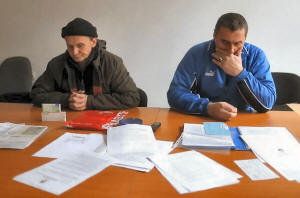|
Bosnian war victims despair at court
fines over reparations claims
 Send a link to a friend
Send a link to a friend
 [March 02, 2018]
By Daria Sito-Sucic [March 02, 2018]
By Daria Sito-Sucic
TUZLA, Bosnia (Reuters) - Bahira was 14
when she was repeatedly raped by Bosnian Serb soldiers who attacked her
Muslim village early in Bosnia's 1990s war. She barely escaped
execution, and has spent the past two decades trying to overcome her
trauma.
Then, on her birthday last year, she received a court fine amounting to
six months' worth of disability benefits that she lives on. She had to
pay court fees for a war reparations claim that she had actually
abandoned years ago.
"When I saw the figure of 3,000 Bosnian marka (1,500 euros or $1,827)
and a warning that I would be detained unless I paid it, I fainted,"
said Bahira, who declined to give her real name.
"That day, I tried to commit suicide, said Bahira, now in her 40s and
married with two children.
Bahira, among the estimated 20,000 victims of sexual violence during the
1992-95 war, was fortunate enough to get free legal aid from a
non-government organization that helped her trim her bill to 600 marka,
which she eventually paid.

But thousands of other war survivors, mainly Muslim Bosniaks, have been
hit by hefty fines after their reparation claims were rejected by courts
in the autonomous Serb region of post-war Bosnia, and have been unable
to obtain legal aid.
Most are jobless, in poor health since their war ordeals and unable to
pay the fees. Those who cannot face seizure of their property or part of
their monthly income, if they have any.
"These victims are generally very vulnerable, and they are now going
through re-traumatization that will be difficult to remedy later," said
Adrijana Hanusic-Becirovic, a lawyer with Trial International, the NGO
that helps victims such as Bahira.
The problem arises from Bosnia's failure to enact a nation-wide law
covering victims of torture, resulting in differing treatment of
reparation claims in its two autonomous regions, the Bosniak-Croat
Federation and the Serb Republic.
FINED FOR STAYING ALIVE
More than 100,000 people died in the fierce ethnic conflict between
Orthodox Serbs, Muslim Bosniaks and Catholic Croats. Hundreds of
thousands were driven from their homes and about 200,000 people were
detained in camps where beatings and torture were common, with 10
percent of them dying in custody, said Jasmin Meskovic, president of war
prisoner association.
Meskovic, whose group has helped some 30,000 people file lawsuits since
2007, said compensation claims were dismissed en masse after Bosnia's
Constitutional Court decided in 2014 to recognize statutes of
limitations for torture offences.
This upheld a Serb Republic statute that required victims to have filed
lawsuits within a maximum five years of the alleged crime to be eligible
for reparations.
[to top of second column]
|

Former detainee Behadil Dizdarevic (R) and Sahbaz Sabanovic react
during interview with Reuters in Srebrenica, Bosnia and Herzegovina
February 20, 2018. REUTERS/Dado Ruvic

The civil procedure code was then amended to introduce fees for
lawyers and public attorneys ranging from 2,000 to 10,000 marka.
Federation courts adopted the same amendment.
Officials say the courts levy the fines to help recover costs of
handling cases that are rejected.
"This has become a (form of) extortion," Meskovic said. "The problem
is for the (mainly Bosniak) victims who returned to live in the Serb
Republic, barely make ends meet..., and then they come and
confiscate their property, salaries and pensions."
The United Nations Committee against Torture, the Council of Europe
and Amnesty International have criticized Bosnia over its lack of an
enforceable national reparation mechanism, saying this violates
international law.
But efforts to pass supportive legislation in the national
parliament have been repeatedly blocked by Serb deputies who say
claims should come under regional not national jurisdiction.
Before the high court ruling, only a small number of victims won
reparations cases and received compensation.
Most wartime detention camps were located in what is now the Serb
Republic and authorities there fear that reparations claims, if
granted, would overwhelm their budgets.
Last week, the Serb Republic assembly passed preliminary legislation
on reparations claims but Bosniaks say it discriminates against them
by setting numerous, onerous terms for non-Serbs to register as
torture victims.

"One gets detained, beaten up, survives the torture and then 20
years later, one goes through a new torture," said Behadil
Dizdarevic, a survivor of two Serb-run detention camps who was
ordered by a Serb court to pay more than 10,000 marka in fines.
"We are paying our dues for staying alive."
(Reporting by Daria Sito-Sucic; editing by Mark Heinrich)
[© 2018 Thomson Reuters. All rights
reserved.]
Copyright 2018 Reuters. All rights reserved. This material may not be published,
broadcast, rewritten or redistributed.
Thompson Reuters is solely responsible for this content. |